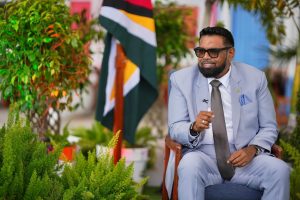Guyana opening up lands for regional agricultural investments- Pres. Ali

Lands in Guyana are being made available for large-scale agricultural investments from stakeholders across the Caribbean Community (CARICOM), as part of the country’s efforts to guarantee that the Caribbean region has enough food for its people.
This is according to President Dr. Irfaan Ali who provided the keynote address for the opening ceremony of the Caribbean Week of Agriculture on Monday. The President is the Lead Head of Government with responsibility for Agriculture in the CARICOM Quasi Cabinet.
During his presentation, which was done virtually, Dr. Ali reminded all that the Caribbean pays a significant sum of money- some US $5 billion each year- to import food for its people.
“It remains a travesty that our region, blessed with arable lands, abundant freshwater supplies and skilled agricultural workers imports more than US $5 billion annually,” he lamented.
With this import bill, the challenge of access to suitable land for agriculture faced by some countries and external challenges such as disruptions to supply chains of goods and services, Dr. Ali posited that action needs to be taken to remedy the region’s food security concerns.
And, he believes that Guyana can help the region.
“Guyana being resource-rich and freshwater is desirous of leading in this area by making available appropriate lands as part of the process of promoting cross-border investment in agriculture.
“… Guyana is currently embarking on a process of consolidated unused and underutilised lands with the aim of making suitable lands more readily available for supporting large-scale agricultural investments,” the President highlighted.
Importantly, Dr. Ali also emphasised that the pursuit of agricultural development and transformation within the CARICOM should not exclude the regional private sector. He mentioned that efforts are already being made to develop an agricultural insurance product for the region to aid with the de-risking of the sector.
Dr. Ali’s acknowledgement of the challenges that exist and the actions required were echoed by many of the speakers at the opening ceremony.
Assistant Secretary-General for Trade and Economic Integration at the CARICOM Secretariat, Joseph Cox noted that the region is working on reducing its food import bill by some 25 per cent by 2025.
He, however, noted that the disruption of the supply chain could have a potentially devastating impact on the region. And, he said the existing regional agricultural production already records a 20 to 30 per cent loss due to damages and wastages.
Meanwhile, Dr. Ali said that Guyana, which engages in large-scale agricultural production, can be a “replicable model” for Caribbean countries. This is so because, over the past year, significant efforts have been made to strengthen and modernise the sector.
According to the President, these include the reduction of on-farm and post-harvest losses, increased investment in large-scale agricultural production, investment in necessary infrastructure such as drainage and farm to market roads, and providing business incentives.
“The transformation of regional food systems is absolutely pivotal to regional food security and regional resilience,” he said.









